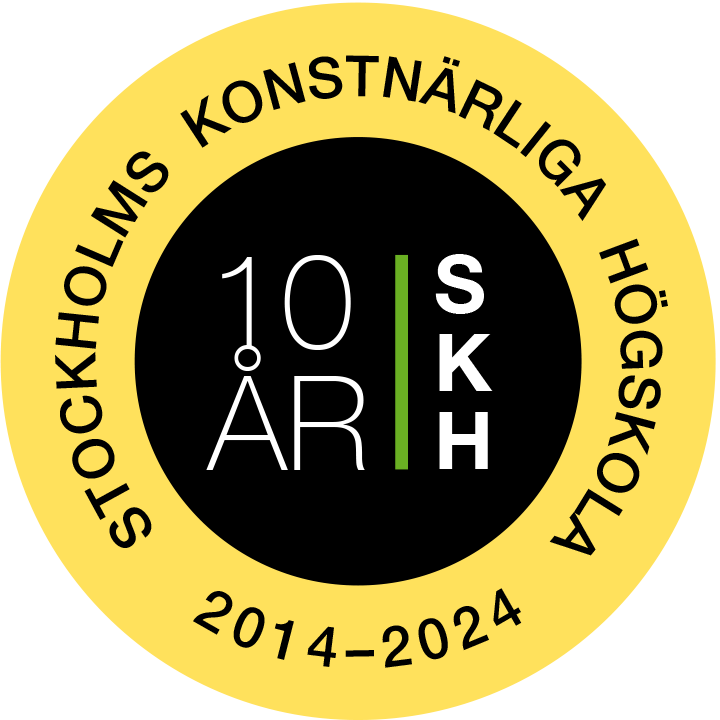Alumni interviews: Stefan Hansen
In connection with SKH’s 10th anniversary, we wanted to ask some alumni how they experienced their time at the university. Those we have interviewed studied at the time when we still used the names University College of Opera (OHS), Stockholm Academy of Dramatic Arts (SADA) and DOCH School of Dance and Circus alongside SKH. First up is Stefan Hansen, who was a student at the Bachelor's programme in Production Management at SADA from 2014 to 2017.
Firstly, I would like to ask: why did you choose SADA?
– I started with theatre in secondary school, the theatre world opened up and became a great leisure interest for me. But it didn't come naturally because of a severe stammer. I had problems expressing myself, simply speaking. Lecturing in front of the class was one of the worst things for me. At the time, I was living in Malmö, and someone said ‘Come to Drömmarnas hus’, where there was a free theatre course. There I met educators who helped me see that there were other things to focus on in theatre than acting and my stammer. Then I started writing and getting people together for different projects and was told by the theatre teachers that ‘You are good at leading processes and organising things. There's a producer programme in Stockholm that you should apply for.’ After secondary school, I applied straight away and wanted nothing else – it was my life goal to get into the programme. The first time I applied I got nowhere. The second time I got to the final interview. But I bombed. After two years, I applied for the third time and I got in.
I didn't bring an interest in culture from home, but with my own discovery of theatre, my mother has also become a real big consumer of the performing arts, among other things.
How did you experience your time at the university?
– I am extremely uncritical and thought it was fantastic all the time. Many of the courses were wonderful and inspiring, sometimes there were more teachers than students, it was like having private lessons. I experienced it as a very generous period with a lot of time for reflection. Those of us who didn't come from Stockholm were also very welcomed by the industry, there were all kinds of opportunities to make study visits and meet the performing arts organisations.
My main teachers PeO Sander, Olle Mattsson and Christina Molander were extremely good dialogue partners. They have been both generous and critical in their discussions. The teaching staff, including Mia Törnqvist, PeO Sander, Hilda Hellwig and Claes Hellwig, gave us time to do a lot of research and to be investigative. They wanted to show a vision of how a utopian cultural institution would work, based on performing arts, collective collaborations. It was inspiring.
Everyone I approached in the sector, such as the Ministry of Culture, were always open and accommodating, access that SADA made possible. Internationally too, the University has a fantastic network with cultural institutions in London, Oslo, Berlin and elsewhere. And my degree projects at GöteborgsOperan and the Swedish Embassy in Washington were made possible thanks to SADA – both later became my workplaces.
Did you students notice the merger of the three schools – if so, in what way?
– I could sense some discord among teachers and dissatisfaction with the workplace. Tougher working conditions and expected synergies that did not materialise. On the other hand, elective courses were offered where there were transcending artistic opportunities and networking. So, yes, I understood that there was a reorganisation going on at the school, but I kept my focus on education.
What did you do straight after graduation and what are you doing today?
– Straight into work immediately after. I worked part-time throughout my education at Teater Sagohuset in Lund, and when I graduated I worked at the Swedish Embassy in Washington under Linda Zachrison, then it was GöteborgsOperan and now I am CEO of the theatre Unga Klara in Stockholm.
Was it beneficial for your future professional network to attend a school with many different artistic specialisations?
– Yes indeed!
Do you have people you work with today that you met during the programme?
– Yes, I do! Many alumni and also several from my class.
How do you see SKH today?
– I have been at SKH and guest lectured on the course International Performing Arts Production about international cooperation. The students I meet and collaborate with today are very exciting with their own ideas and knowledge. They are really fun to work with. My impression is that the programmes are cross-genre. And if you want to achieve collaborations and synergies – you have to see the whole and not just your own part.
SKH ten years

SKH is celebrating ten years as a university college in 2024, ad we'll be filling the year with retrospection, foresight, articles and events that connect to the decennial in various ways.